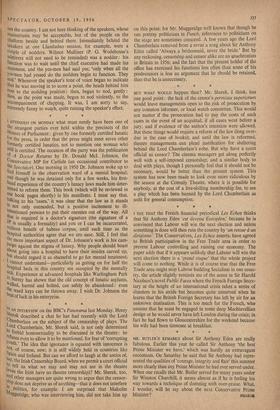11 AN INTERVIEW on the BBC's Panorama last Monday, Henry
Sherek described a chat he has had recently with the Lord Chamberlain on the subject of the censorship of plays. The !-Ord Chamberlain, Mr. Sherek said, is not only determined '0 forbid homosexuality to be discussed in the theatre : he refuses even to allow it to be mentioned, for fear of 'corrupting pot. The idea that ignorance is equated with innocence is ':)t, of course, new; it is still widely held in countries like 'pain and Ireland. But can we afford to laugh at the antics of, say,' the Irish Censorship Board, when we permit a court official to tell us what we may and may not see in the theatre `even the Irish have no theatre censorship)? Mr. Sherek, too, "tia.ci other managers are quite wrong to argue that the censor- rail) does not deprive us of anything—that it does not interfere Politics, for example. I am surprised that Malcolm Muggeridge, who was interviewing him, did not take him up on this point; for Mr. Muggeridge well knows that though he can portray politicians in Punch, references to politicians on the stage are sometimes censored. A few years ago the Lord Chamberlain removed from a revue a song about Sir Anthony Eden called 'Always a bridesmaid, never the bride.' But by any reckoning, censorship and censor alike are an anachronism in Britain in 1956; and the fact that the present holder of the office has exercised his functions less often than some of his predecessors is less an argument that he should be retained. than that he is unnecessary.


































 Previous page
Previous page